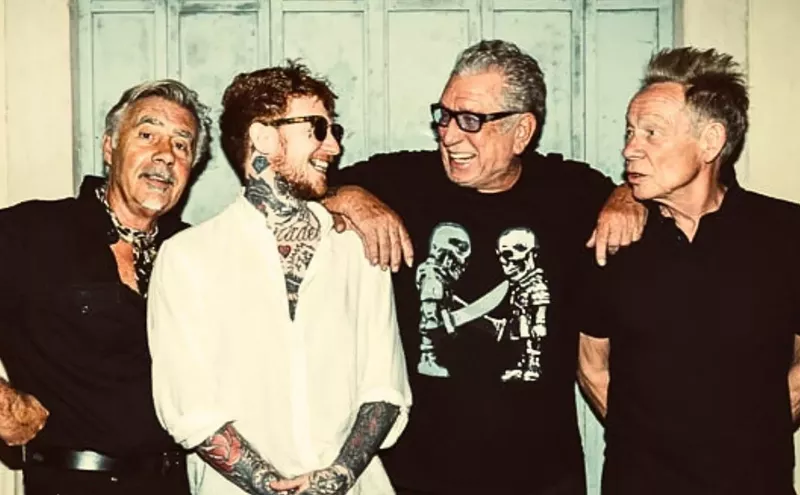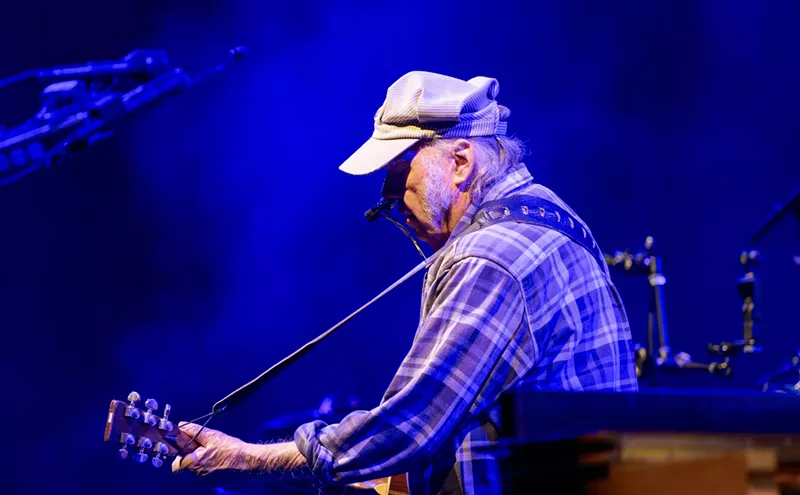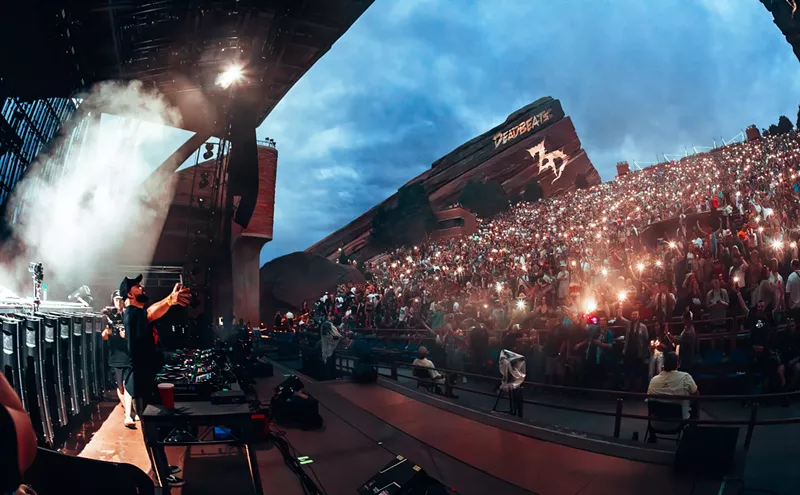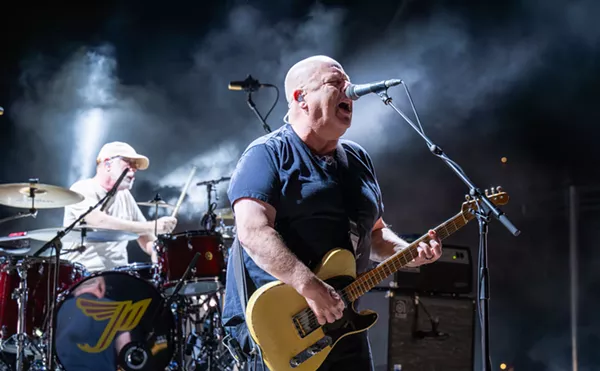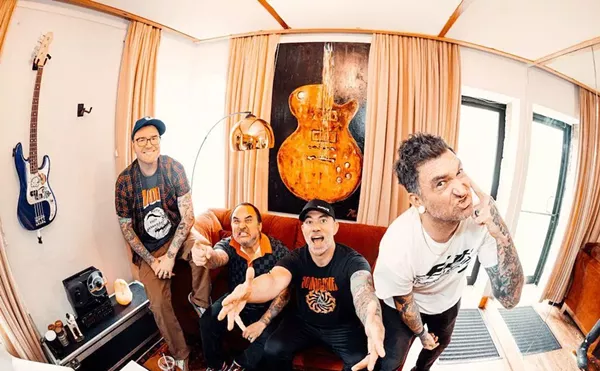I remember at Tiny Telephone we ordered Chinese and my fortune cookie said, 'If you don't do it excellently, then don't do it at all,'" muses singer Kyle Gray about recording Rubedo's debut full-length, Massa Confusa, in San Francisco. "And Ikey just started laughing hysterically."
The Ikey in question is Isaiah Owens, the genius keyboard player and producer who used to play in the Mars Volta, one of Rubedo's main musical inspirations. The fact that the band got to record with Owens feels like kismet, one more link in a chain of fortunate happenstances that has been at the heart of the band's history since Gray met drummer Gregg Ziemba while both were attending Traylor Elementary School in Denver.
"I remember seeing him in class making funny faces," recalls Ziemba. "I was like, 'I wanna be friends with that kid.'" As the two got older, Gray learned to play bass and Ziemba the drums, and they jammed together as only people in their early teens can. In high school, they met guitarist and bassist Alex Trujillo; he and Ziemba were in jazz band together. Trujillo was already a bit of a veteran, having played with blues musicians around town even as a teenager, and he taught Ziemba a lot about music from a perspective outside of school.
After high school, Trujillo and Ziemba formed the progressive rock band Tangible Stereo, and Gray become involved in Red Orange Yellow toward the end of that band's trajectory. But Gray's restless spirit carried him away from Denver even as Tangible Stereo was fizzling. For a time, he hitchhiked around the country, homeless and, to a large extent, aimless. But one fateful night a phone call put him back on track.
"I was in Florida, and I was sleeping on the side of the street next to some meth heads or something," remembers Gray. "I had this dream, and this character asked me what I was doing with my life, and I said, 'I don't know.' Then I woke up. So then I decided to call Gregg that day. We hadn't talked in a while, and I said, 'Hey, I want to see if you and Alex want to get together and make music.' It was synchronistic, because he said they had already talked about it and they were going to call me."
Ziemba had had a dream in which he, Trujillo and Gray were in a band together but doing something more serious, and he thought it would be nice to play with the other two again after their time apart in separate projects. "I was on the bus the next day thinking so hard about it," recalls Ziemba. "All of a sudden, Kyle called me and said, 'I want to start a band with you and Alex.' I was like, 'All right, I guess we have to start a band.' He said, 'I'm in Florida; I'll be back in a week.'"
Ziemba later spoke with Trujillo, who had been thinking along similar lines, and when Gray returned to Denver, Rubedo was born. The band got its name from Gray's interest in the philosophy of Carl Jung and alchemy. After rejecting Albedo and Nigredo, the trio settled on Rubedo.
"It's weird how we choose things like that kind of randomly but they end up really taking on the meaning of the project we're doing," observes Gray. "We were applying our music to this world and bringing it to fruition, and that is the process of rubedo."
"We're definitely reaching toward that idea of the new awakening of self, consciousness — taking what you know and passing it along to others," adds Ziemba. "We haven't got there yet, but we're working toward it."
Through the alchemy of intention and manifestation, Rubedo wrote its early songs in 2010 and recorded its promising debut EP, Lapis Sephorum. But the group didn't stop there: Before the year was out, the guys met Owens when he was in town for a show with Free Moral Agents, his Mars Volta side project, and approached him about producing Rubedo's first proper album.
It was then that Gray's wanderlust struck again, and he left for Peru in search of himself while Ziemba took his own sojourn to Colombia. Before that could happen, though, someone broke into the band's van and stole most of Gray's gear, including his Moog Prodigy. But life has a weird way of making things work out: The band was able to recover its stolen gear through insurance, and after the hiatus, Rubedo came back together stronger than ever.
The initial plan was to record at John Vanderslice's Tiny Telephone studio in the fall of 2010. That fell through, but the band was able to get Owens back on board last year. To prepare for the studio time, Owens rehearsed the band in a practice space in San Francisco rented by the band's label, 20 Sided Records.
"[Owens] was just sitting on this couch with his hood on, smoking, listening to us," says Ziemba of those sessions. "He was listening intently, you could tell. He would come up to me and be, 'All right, listen to Kyle's lyrics, what he's saying. You're playing the beat a little bouncy. Make it more like a death march.' Things I never would have thought of."
"Then when we went into the studio," adds Ziemba, "he was like, 'No click, we're just going to do it like the old days, like the jazz dudes used to do. You're going to do two takes maximum of songs.'"
The resulting album, Massa Confusa, engineered by Jay Pellicci, sounds raw but sophisticated, and informed by both a sense of delicacy and intense emotions channeled into expansive melodies. "We wanted it to be like a hip-hop record," Ziemba explains. "Where, like, the bass hits and people can listen to it on their subs and you can't hear anything but the bass."
"So it was a little hard for us to imagine it as a whole record," Gray elaborates. "It was hard to hear it, because it seemed like so many random things going on. But when it was all put together, the chaos came together and it actually sounds cool."
Like the band's name, the album's title is a reference to an alchemical concept. "What I read about it and really liked is the chaotic part of man before the knowledge of what chaos even is," Ziemba reveals. "Like a primitive chaos, trying to figure things out, coming together. That's definitely what this felt like.
"Every single experience we had was a brand-new experience," he concludes. "It always felt like, 'Am I really here? Am I supposed to be here, or have I faked it this far? What's going on? How is this happening?' Now, after this point, we can go forward and go in with an understanding, not like Making a Record 101. I feel comfortable now. It's really cool."



